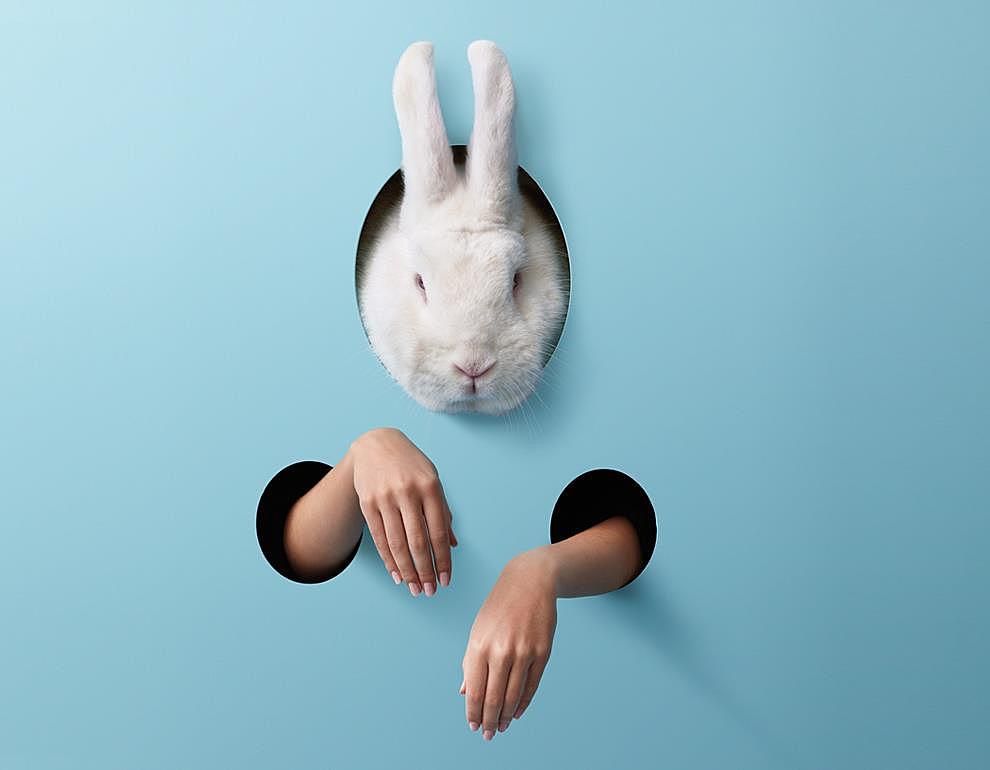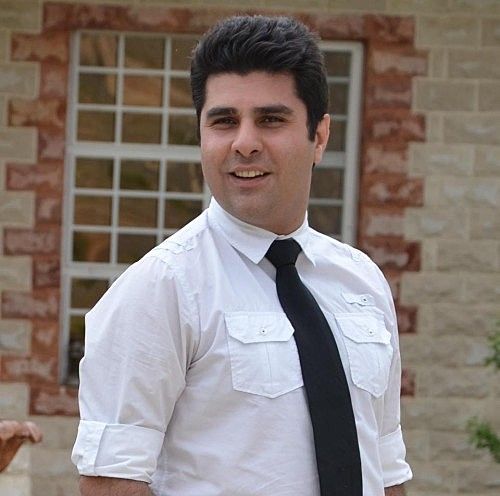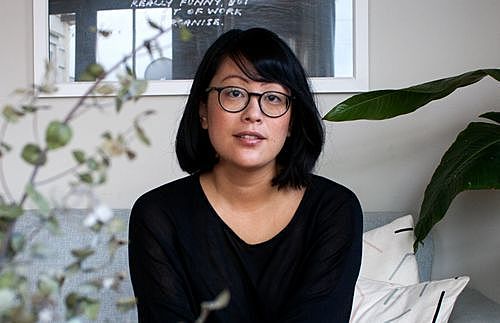White Rabbit, Red Rabbit: Nassim Soleimanpour and the Politics of Freedom
They call it the play nobody's allowed to talk about - with good reason. On the back of Silo Theatre's recent season of White Rabbit, Red Rabbit, Rosabel talks to Iranian playwright Nassim Soleimanpour about his work, his freedoms and the importance of pizza.
It’s been described as the play nobody’s allowed to talk about. White Rabbit, Red Rabbit. All you know, going in, is this: it was written by an Iranian playwright named Nassim Soleimanpour who, at the time of writing, was unable to leave his country. He had refused to complete his mandatory military service – wanting to focus on his career instead – and so was denied a passport. Rabbit was his response to being denied his freedom to leave. To roam.
Or you may not even know that. What you may know, instead, is this: you can’t talk about it because there’s a different actor each night, and it isn’t until they’re standing on the stage, in front of an expectant audience, that they’re handed the script they’re about to perform. The next ninety minutes are as much a journey for them as it is for you.
You may think, walking in, that it sounds a little gimmicky, but you will think, walking out, that it works. It works because of the ideas driving it: because it creates a living, breathing dialogue between the actor, the writer and the audience. It thrusts onto the stage the kinds of questions that usually remain invisible to an audience: what purpose theatre serves, why we write, and what types of relationships the playwright can have to the performers and the audiences of their work.
By stripping the play of rehearsals, the audience gets to share the process of discovery with the one person they’re never allowed to share it with: the actor. Generally, by the time you see a show, those on stage will have spoken their lines countless times in a fluorescent rehearsal space somewhere — balancing their pitch, their tone, their pacing and making sure they’re creating a convincing reality for you, the audience. You’re never privy to the moments they find personally funny, powerful or outrageous. That’s not their job. They’re there to serve the story. They’re there to serve you.
Rabbit is not about Iran, as Soleimanpour is always quick to stress, but about obedience. Yet it’s only because of Iran the play exists. “There were three parallel things [that led me to write it],” he says when we speak on the phone. “First of all, I didn’t have my passport and I wanted to travel and I wanted to perform theatre.”
“I had done many things in theatre before – I had been a director, a playwright, a set designer – and I always felt like we theatre-makers like theatre mostly because of the joy we find in rehearsals. More than the performance. So I came to the conclusion that I’d love to share my rehearsals with my audience. That was the second fact.”
“And the third one: I had this nightmare in which I was committing suicide on the stage in front of an audience, including my close friends and my parents.” He pauses. “That was the moment I thought to write the very first draft of Rabbit.”
The play took seven years to write. It went through many iterations. He wrote the first draft thinking he was going to perform it himself. That was his dream: “I’m going to write a play and then I’m going to receive my passport and then I’m going to tour that play and I’m going to travel with my show.” As he refined it, it changed. “In the third of fourth version I wanted to use a headset to ask different actors to perform the play, and I could talk to them, telling them the whole thing, asking them to do different stuff for me, and then it changed. It changed. The last version – that was when I decided to put the site-reading and ask a fresh actor to read the text in front of the audience for the first time.”
You gather from Rabbit’s evolution that Soleimanpour is about concepts. About strategy. He wants to challenge the very framework of theatre, the way we use the paradigm itself. It’s a way of thinking that seems to marry his various career lines: he’s a theatre practitioner – having worked as a director, a playwright, an actor, and a manager of theatre festivals – but started out as an engineering student, specialising in telecommunications. He left his degree before finishing, switching to a degree in performing arts where he majored - perhaps surprisingly - in set design. Following that, he worked at an architectural company before returning to the University of Tehran to teach computer-aided set design. Soleimanpour’s approach to theatre, of deconstructing it to its basic elements, seems to reflect the more analytical approach of working with systems, of working strategically to a brief, of teasing apart function and form and designing with a purpose.
And now? “I’m a full-time writer,” he says. “I quit everything.” He’s working on a number of projects, including three plays. Rabbit, he announces, is part of a trilogy. The second in the trilogy is a play called Kink Kangaroo. “Structurally,” he says, “it’s one step further. It’s a play with no set, no rehearsal, no director and this time even no actors.”
“No actors,” I echo.
“The play is going to cast itself,” he explains. “The audience will perform the play for themselves, but the play will try to find the best actors among the audience and put tests to find them and convince them that they have to perform the play.”
It’s odd to hear the play referred to as a sentient being, but it feels natural given the way that Soleimanpour creates. “The third part of the trilogy,” he tells me, “is also working on the structure of drama.” It’s like a monologue with blanks. “So I can ask different writers to collaborate with me to write a play in front of the audience each night. “So we have a play with no set, no director, no rehearsal, no actor and even the text is half-written. So it’s almost done.” He pauses. “I think after that I can quit being a playwright. I think the fourth one is going to be where I have to shut up.” *
One of the most striking elements of Rabbit is the way it teases apart and places at the forefront the different roles of the playwright and the actor and the audience. Through the actor, Nassim actively encourages his audience to email him, to send him their thoughts and their photos, and when I talk to him three days after the opening night of Silo Theatre's recent season, he tells me he’s already received a handful of emails from Auckland audience members. Given the play has been translated into fifteen languages over the past three years, that’s a lot of emails. “It’s really affecting my life,” he tells me. “It takes time. You receive so many emails per day and then you want to answer all of them because they kindly told you what they think. And you ask them in your play, you know, for their emails. So you have to spend hours answering these emails. But it's good for my English.”
“I feel like I live in a small world. And I’m not the best possible artist because I’m receiving the most beautiful emails. So I feel like-” he enters into an internal monologue, as he’s prone to doing, laying bare his entire thought process – “Who told me I have to write to everybody? They should sit. I give a talk and everybody will learn. No. I have to find a way to help different people to talk so that I can sit and listen and learn. So I became an audience. That’s what happened to me. I became a professional audience. Which is to receive emails, read them, read reports, reviews, and learn. I’m a bit like a student right now.” *
He’s also a bit of a teacher right now, having recently returned from running a two-day workshop in Brazil. When I ask him about his routine – under what conditions he works best – he jokes that it’s as soon as he can get rid of his dog, Poppy.
“I tell you, it’s a wise question. It’s part of the workshops that I’m teaching right now, that question.” He goes on to paint a picture of a typical routine, falling again into a kind of internal monologue: “I put myself in a room, I close the door, I tell myself to work for four hours, then for a prize, or reward, I go out.” He exhales. “That’s not my style. My style is: I accept that I’m not a writer. I’m not a good writer. So why would I waste my time on writing?” He laughs. “I have different choices. Sit down. Write in English – which is killing me! It’s really hard - and then go to Google everything and see if you’re right or not and then pay somebody for a proofread and then talk with your agent and then go to Istanbul to meet somebody who’s a producer from London and then work hard to get your visa so you can sit on a plane for two days to get to Australia – that’s stupid. That’s the first choice. The second choice? I have to go out! And eat pizza! So I’m smart to pick the second one. That’s my style of writing. That’s how I write. I tell myself: fuck it. I go out and eat pizza. And that’s how it took me seven years to write Rabbit.”
It’s a question of pragmatism in some ways. He could choose to write in his mother tongue, easily, and be subject to the harsh Iranian censorship process, or write in English. He’s chosen English. It’s an approach that lies in contrast with his father, a novelist who writes in Persian, who’s never been translated into other languages, and who won’t be seeing his son’s play anytime soon: Rabbit has never been performed in Iran, though Soleimanpour says this isn’t strictly due to the country’s censorship rules. “The main thing,” Nassim tells me, “is that I’m not putting Rabbit into somebody’s hands to translate into my mother tongue."
“I know my mother tongue better than English,” Nassim explains, “and I don’t feel like I’m happy to translate it right now.”
Part of this is due to the process it would have to go through, which runs against the whole point of the play. But it’s also because of his greater vision – again, he’s a concept man. “When I wrote Rabbit I had this dream for the play. And I thought Rabbit will have a journey in space. It works because you are so far from me, right now, because you went and saw the show in Auckland, and then there was this guy from Iran who was manipulating you, and you feel like, ‘Oh my god. Look at this distance. It’s working.’
“But the other ambition in Rabbit for me is travelling in time. Just think what's going to happen when years pass and I become an old man. Right now I'm 31. Still young. I'm going to go and play football today. So what would happen if I become 65? Or if I die? And then you put Rabbit on the stage. Even in Iran.” Thinking about the play being performed in the future, more than other plays, makes it a profound experience – like stumbling upon a voicemail from somebody who is no longer alive.
“People are going to perform it in Iran and then there is this guy, in the past, 2010, and he is manipulating you. So my ambition is doing Rabbit in Iran. I'm gonna do it when I'm… at least I have to be over 40. That's how I feel.” *
Things have changed for Nassim since he first wrote the play. Last year, he was diagnosed with a disorder in his left eye and was excused from military service. He has a passport now. He saw his own play for the first time in February this year, in Brisbane. He’s also travelled to Turkey and Brazil. You can hear the exhilaration in his voice.
Asked if he is thinking of moving overseas given his newfound freedom, he says, without hesitation, “Yup. I’m not going to hide it. We are talking about it. It’s about my wife – she has to decide. And then it’s about my agent. We’re negotiating to find good opportunities.”
He tells me he doesn’t actually feel like he lives in Iran. “I just purchased this apartment in Tehran but I don’t go to theatre. I don’t perform in my own country. I don’t teach. I just spend some time with my wife and my family. It feels like I’m done with my country. I love it. But it’s not working.
“I’m living in this rich but closed island. People don’t speak English. It’s hard for them to get visas to go to other countries. They don’t have enough money to travel too much. It costs them too much to go to Europe, or the US, or wherever. So they live in ignorance. They don’t know what’s happening around them.”
And where would he like to move to? “I have good friends in Canada, so I would love to stay in Canada. I cannot forget my good experience of Australia because that was the first time I was out of Iran. And it’s stayed with me. But if I can stay in Europe, it’s going to be easier for me, because I have to travel to teach and to meet with people, and that covers many countries.” He muses on the possibility of living in Edinburgh, a city that’s performed his show three times. “I can easily move,” he says,” he says, “But then again, I’m an Iranian. It’s not that easy.”


